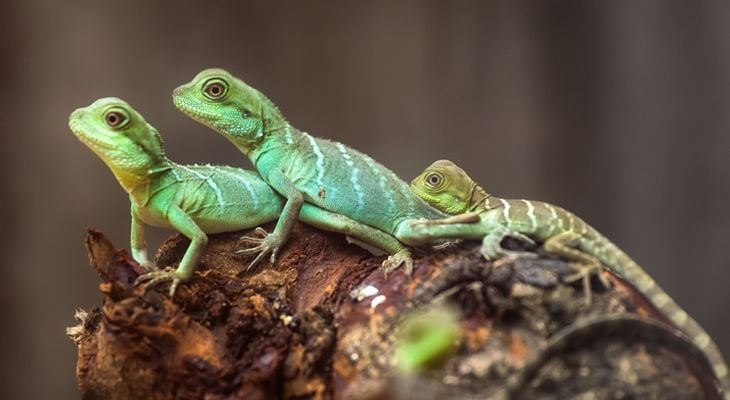Fleas are not only a source of irritation and frustration, but they also pose a serious health threat to animals. These tiny external parasites can carry a variety of diseases, including bubonic plague, and severe infestations may cause deadly levels of blood loss in very small or young pets, according
Read more

People with limited living quarters may find that reptiles such as lizards or turtles fit perfectly into their lifestyles. Before deciding on a reptile, learn as much as possible about them and their needs. Poisonous snakes and certain reptiles should never be kept as pets. Ask your veterinarian about the suitability of a particular animal before you make your decision. There are many things to consider before committing to a reptile as a pet.
Finding out if a Pet is Legal Where You Live
Many areas have enacted laws pertaining to keeping reptiles. Some are general and some are quite specific; in many places any reptiles that are considered dangerous (venomous snakes, alligators, etc.) are illegal but some places are even more restrictive (for example, in some states all constricting snakes including ball pythons are illegal).
Salmonella Risks and Prevention
All reptile owners need to be informed about Salmonella infections. While the risks shouldn't keep most people from keeping reptiles since with the proper management the risks are minimal. Still, owners should be aware of the risks, and the US Centers for Disease Control recommends that certain risk groups should be careful about contact with reptiles and amphibians.
The Importance of Light and Heat
Many problems with keeping reptiles can be traced back to not providing the proper environmental conditions, particularly heat. Proper lighting is also important for many reptiles. The equipment to provide the proper heat and light to captive reptiles is often quite expensive, but is absolutely essential to keeping pet reptiles healthy. It is important to find out exactly what conditions your reptile needs and never cut corners when it comes to meeting those conditions!
Why Choose Captive Bred Reptiles
There are numerous reasons why you should pick a captive bred reptile if at all possible, as explained here.
How to Pick a Healthy Reptile
It is important to keep in mind that depending on where you get a reptile, it may be very stressed, dehydrated, and prone to illness. Here are some items to look for when buying your reptile to increase the chances of picking out a healthy pet reptile.
While there are many types of reptiles that could be good pets, here we cover a few you could consider.
-
Flea Preventative Medications: Oral vs. Topical
-
Fleas, the Frustrating Pest
Consider the following scenario: You arrive home from a long flight from a wonderful, two-week vacation. As you drive home, you remind yourself the boarding kennel is already closed and you have to wait until tomorrow to pick up your dog, Max. You finally walk in the front door, happy to be home. As
Read more -
Giardia: A Parasite of Many Species
If you have a friend who camps or fishes, you may have heard that they had been infected with Giardia. Or your veterinarian may have told you that your cat or dog had Giardia. In either case, you probably wondered, can I catch it as well? Giardia is a protozoan parasite (one-celled organism) that can
Read more -
Stress Relief for Pets
Stress isn't just a problem for humans; your pet can experience the negative effects too. Illness, changes in the usual routine or the death of another pet can lead to an increase in your pet's anxiety level. Luckily, there are a few things you can do to help your furry friend relax. Signs of Stress Your
Read more -
Vetopedia
Vetopedia is a glossary of terms used by vets in treating animals. A B C D E F G H I J K L M N O P Q R S T U V W X Y Z AAFCO Association of American Feed Control Officials; an organization which sets standards for pet food ingredients and minimum daily requirements. Abdomen A region of the body between
Read more -
Hip Dysplasia
Hip dysplasia is a congenital disease that, in its more severe form, can eventually cause lameness and painful arthritis of the joints. It is caused by a combination of genetic and environmental factors. It can be found in many animals and, rarely, humans, but is common in many dog breeds, particularly
Read more -
Diabetes Mellitus
Diabetes Mellitus (DM) is a life long disorder of dogs and cats that results when the pancreas fails to produce enough insulin to meet the animal's needs. Insulin is a hormone needed to transport glucose (blood sugar) into the body's cells. When there is a lack of insulin in the body, blood glucose rises
Read more -
Veterinary Acupuncture
The use of acupuncture is growing in popularity among veterinarians and the practitioners say they are impressed with the results. Only a few decades ago, the use of acupuncture in veterinary medicine was virtually unheard of. In recent years, the use of acupuncture in veterinary medicine has been steadily
Read more -
The Cutting Edge... Laser Surgery for Pets!
It's doubtful that anyone would picture their family veterinarian swinging a light saber on the bridge of some galactic cruiser, but he or she may just have a similar technology available to help keep your pets comfortable during surgery. For more than 30 years, human doctors have used various
Read more -
Hi Tech Veterinary Medicine
Advances in human medicine seem to occur on a daily basis as research and new technology bring new possibilities and hope of healing. And veterinary medicine and surgery continues to follow closely behind. Within the past twenty years, new technologies in diagnostics and surgical techniques have made
Read more -
Laparoscopic Surgery
Surgery is a scary thought for anyone, but advances in human medicine are helping to make patients more comfortable and shortening stays in the hospital. Even our pets are now benefiting from these improvements as cutting edge innovations are making their way into veterinary offices, providing a higher
Read more -
Pet Microchips
Essentially, microchips are computer chips about the size of a grain of rice. Easily implanted under your pet's skin by a hypodermic needle, microchips provide permanent identification that won't wear out, fade, or get lost if the pet runs away. Special scanners find the microchip and can translate into
Read more -
Fresh Breath and Straight Teeth
Although many of us dread it, we visit our dentist routinely to insure our mouth stays healthy and our smile bright. Our pets also benefit from a visit to their dentist and advanced dental care is quickly becoming more common. That's right…braces for Boxers, crowns for kitties and a root canal for
Read more -
Cloning Pets
Ever wanted an exact copy of your favorite pet? Well, now it's possible - but is it smart? Most pet owners have suffered the loss of a very dear and special pet. And while owners would like to keep their dear friend with them forever, very few would actually go so far as to entertain the idea of cloning. To
Read more -
Winter Dangers for Pets
Winter is a time of cold weather festivals, holiday parties, and changing weather. For pets and pet owners, this season can bring its own unique set of challenges and hazards. Keeping your pet safe during this time of year will require some preparation and homework. Family gatherings and get togethers
Read more -
Traveling with Pets
According to a survey of pet owners by the American Animal Hospital Association (AAHA), more than 53% of dog and cats will travel with their owners. With the upcoming busy travel season, what are the best ways of traveling with your best friend? It has been said that "an ounce of prevention is
Read more

